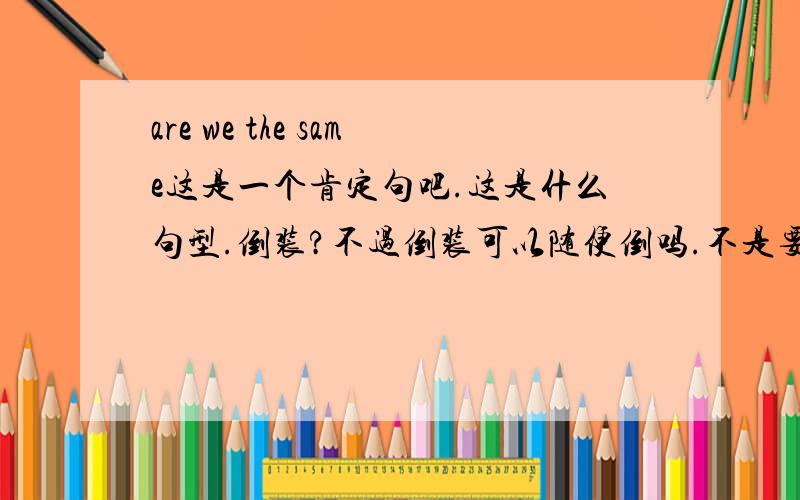are we the same这是一个肯定句吧.这是什么句型.倒装?不过倒装可以随便倒吗.不是要加only之类的词吗.求高手.能举些相关例子最好.谢谢
来源:学生作业帮助网 编辑:作业帮 时间:2024/07/12 09:42:09

are we the same这是一个肯定句吧.这是什么句型.倒装?不过倒装可以随便倒吗.不是要加only之类的词吗.求高手.能举些相关例子最好.谢谢
are we the same
这是一个肯定句吧.这是什么句型.倒装?不过倒装可以随便倒吗.不是要加only之类的词吗.求高手.能举些相关例子最好.谢谢
are we the same这是一个肯定句吧.这是什么句型.倒装?不过倒装可以随便倒吗.不是要加only之类的词吗.求高手.能举些相关例子最好.谢谢
这不是否定句吗,怎么会是肯定句呢.倒装也不是所有的都能倒的呀.加only确实是倒装,
only are we the same.
常见的倒装有两种,即全部倒装和部分倒装.
1. 全部倒装
将整个谓语提到主语之前的称为全部倒装.常见的有:
(1) 在There be (appear,come,exist,happen,lie,live,remain,seem,stand)句型中.
①There stands the Bell Tower in the centre of the city.位于市中心的是钟楼.
②There lived an old fisherman near the.sea.在海边住着一位老渔夫.
(2)以down,up,in,out,here, there,now,then,back.away,off over等副词开头的句子.
①Up stood the judge and began to question the murderer.法官站了起来,开始审问那个杀人犯.
②Out ran the thief.小偷跑了出去.
但主语是代词时不能倒装.
Away he went.他走了.
(3)将表示地点的介词短语放在句首时.
①In front of the building is a vineyard. 楼前有个葡萄园.
②Down the street walked the marchers. 游行的人沿街而行.
(4)直接引语的一部分或全部放在句首时.
① “What does the word mean?” asked the boy.“这个单词是什么意思”?男孩问道.
② “Yes,” replied John, “I’m wrong.”“是的,” 约翰回答说,“我错了.”
(4) now, then位于句首,谓语是表示“出现”的动词,如come, appear等,用全部倒装.
①Now comes your turn. 轮到你了.
②Then appeared a man in the distance. 然后在远处出现了个人.
2. 部分倒装
将谓语的一部分(即情态动词、系动词或助动词)提到主语前的称为部分倒装.如句中没有情态动词、助动词或系动词,谓语只是一个实义动词,要在主语前加助动词do,does或did,主语后的实义动词用原形.常见的有:
(1) 含有否定意义的词never,seldom,little.hardly,not,scarcely,nowhere,by no means(决不)等置于句首时.
①Never have I seen such a man.我从来没有见过这样的人.
②Not until yesterday did we know that he had died of cancer.
直到昨天我们才知道他死于癌症.
(2)以only修饰的副词、介词短语或从句放在句首时.
①Only then did I realize that I was wrong.只是到那时我才意识到我错了.
②Only in this way can you improve your English. 只有这样你才能提高英语水平.
③Only when he is free does he come to see me. 只有当他空闲时才来看我.
注意:only 修饰状语从句放在句首时,只能倒装主句部分.
(3)当so置于句首意为“也如此”,neither,nor置于句首意为“也不”时.
①They all finished the work.So did I.他们都完成了工作,我也完成了.
②We have never been abroad,neither has she.我们从来未去过国外,她也没去过.
当so表示对前句内容的肯定和附和,译作“确实,正是”时,用自然语序.
一The students work very hard.学生们学习努力.
一So they do.他们确实是这样.
(4)当not only…but also, so/such…that, not… until, no sooner… than, hardly… when等连词置于句首时.
①Not only did we lose all our money,but also we came close to losing our lives.
我们不但把钱全丢了,还几乎丢了命.
②So hard does he study that he often forgets food and sleep.
他学习如此努力,常常是废寝忘食.
③No sooner had I gone out than a friend of mine came to see me.
我刚出去,就有一位朋友来看我;
(5)在as引导的让步状语从句中(名词/形容词/副词/动词+as+主谓结构).
①Child as he is,he knows more than you.虽然他是孩子,但他懂的比你多.
②Tired as he was,he continued the work.虽然他累了,但他继续工作.
③Much as I like it, I will not buy it. 虽然我很喜欢这东西,但我不想买它.
④Try as they may,they will not succeed. 尽管他们很努力,但不会成功.
(6)虚拟语气的条件状语从句省去 if时,须将were,had,should提到句首构成倒装句.
①Were I in school again, I would work harder. 如果我重新回到学校,我会加倍努力学习.
②Had you not helped me, I wouldn’t have succeeded. 若不是你帮我,我不会成功.
③Should it rain tomorrow, the crops would be saved. 如果明天下雨,庄稼会得救的. .
(7)频度副词often, always, once, now and then, every other day, many a time等放在句首时.
①Often did we go for walks together after supper at that time.
那时,我们晚饭后常一块儿散步.
②Every other day did he go to the hospital to see his father.
每隔一天他就去医院看望他父亲.
(8)为了使句子保持平衡,为了强调表语或为了使上下文紧密衔接时,常使用倒装语序.
①Gone forever are the days when the Chinese people were looked down upon.
中国人被瞧不起的日子一去不复返了.
②Also present will be a person who thinks up an idea for an advertisement.
出席会议的还有广告的策划者.